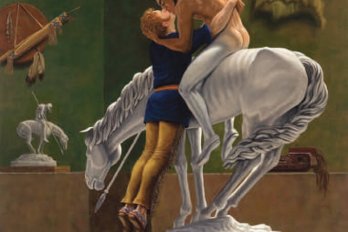portage la prairie—“They’re comfortable in front of the camera,” says Wanda Daniels. In short order, the administrator of the embryonic Indian Residential School Museum of Canada has arranged an interview with two survivors for my documentary about the schools: her seventy-nine-year-old mother, Grace Daniels, and eighty-three-year-old uncle, Max Merrick. “When the last crew was here, they were the ones to speak.” Uh-oh — competition. “Who has been here already?” I ask. “Al Jazeera.”
Wanda pulls a sheet of paper from the filing cabinet in the corner of her office, formerly the principal’s, in the old Portage Indian school building. The page is embossed with the letterhead and curlicue logo of Al Jazeera Network, English Language Channel, Washington D.C. — a thank-you note from producer Chieu Luu for help with “our story about residential schools in Canada that we aired in December 2006.”
Little more than a decade after the last one closed its doors, Canada’s Indian residential schools are widely regarded as one of colonialism’s worst excesses — great material for a channel that delights in tarring the West’s moral authority. In the past century, about a hundred thousand First Nations students boarded at 132 such schools on the prairies, along the Pacific coast, and in the North, which were mandated by the federal government and the churches to educate and civilize hapless native children. Many of the buildings that housed the schools have been demolished or have simply fallen down, but the Long Plain First Nation is taking over the Portage school, a 1910 structure that looms over wheat fields at the edge of town, to turn it into a museum of a difficult past. It had seemed a logical place to shoot a story on the subject — and not just to me.
Grace and Max are leafing through a stack of photographs of themselves as students in the 1930s. Had you heard of Al Jazeera before they came here, I ask, turning to Grace. “No,” she says, “but they came a long way to see us.” What did they want to know? “The same things you’re asking about. What it was like in this school.”
We follow them on a tour of the building, which operated as a school until 1975. In the back, where today the band is planning to build a subdivision of twenty new houses, the students once worked farms and gardens. The girls, Grace tells me, would retreat to the far corners of the garden patch, out of earshot of the white staff, “to speak among ourselves in our own language.” For the boys, a hockey rink, complete with boards and penalty boxes, occupied the space on the south side, now given over to a parking lot for the band-run gas station, snack bar, convenience store, and bingo hall. From the time they were small children until they turned fourteen, Max and Grace would have been handed over to the matron, principal, and dormitory supervisors each September, then watched their father drive off in his horse-drawn wagon, not to be seen again until maybe Christmas.
I try to imagine how this must have looked to the Al Jazeera crew, and to the network’s audience. “We showed them what we’re showing you,” says Grace. “The rooms we slept in, twenty-five younger girls in each; the dining room where we girls sat on one side, the boys on the other; the laundry rooms and the shower rooms.”
At a gloomy end of the school’s basement, rusting pipes and concrete floors speak of things more complicated than simply staying clean. When two boys were caught a few days after an escape attempt, Max recalls, he and his classmates were brought down to the shower rooms to see justice meted out. “They stripped those boys naked, and the principal, with his leather strap in his hand, told us, ‘This is what’s going to happen to you if you run away.’” In silence, we climb out of the dungeon into the brilliant sunshine of the prairie afternoon.
When I get home, I contact Chieu Luu in Washington to find out how he knew about Canada’s residential schools. He refers me to Al Jazeera’s press office, and that’s where the trail goes cold. The network’s relationship with the Long Plain First Nation deteriorated after the residential schools story, Wanda has told me. The network had hoped for the reserve’s help with another this time about white families from as far away as the southern United States adopting children from Canadian prairie reserves in the 1960s and ’70s, but former chief Ernie Daniels, Al Jazeera’s contact and Wanda’s older brother, changed his mind and decided not to talk. “He was worried about their reputation,” Wanda said, “you know, that Al Jazeera just wants to criticize the Canadian government. And he doesn’t want to get into any trouble.”




